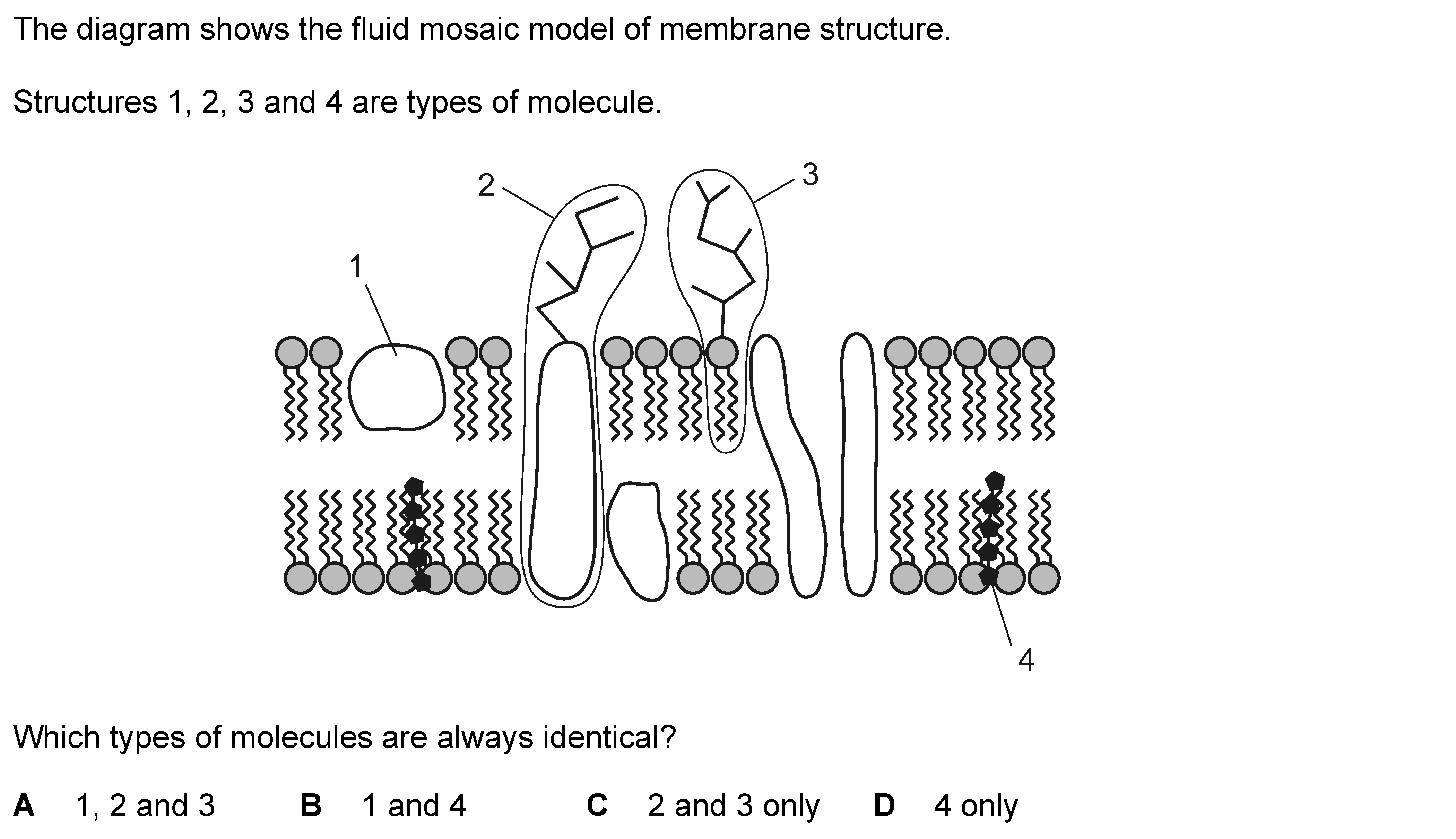
Q15:
AS & A Level Biology - 9700 Paper 1 2020 Summer Zone 2
Questions:
15/40

Topic: CH8 - TRANSPORT IN MAMMALS
Solution
Solution is D

PRACTISE
Similar Questions

LEARN
Concepts with Sparky

More Questions from this Topic
MCQ
CH8 - TRANSPORT IN MAMMALS
The following tissues carry an electrical impulse during the cardiac cycle.1. atrioventricular node2. muscle wall of atria3. Purkyne tissue4. sinoatri...
2024
 Summer
Summer
 Summer
Summer
 4
4
MCQ
CH8 - TRANSPORT IN MAMMALS
The diagram shows the internal structure of the mammalian heart. Which letter identifies the location of the atrioventricular node?
2024
 Summer
Summer
 Summer
Summer
 5
5
MCQ
CH8 - TRANSPORT IN MAMMALS
The graph shows changes in the volume of the ventricles during a single cardiac cycle.Which row is correct for the atrioventricular valve at P and for...
2024
 Summer
Summer
 Summer
Summer
 4
4
MCQ
CH8 - TRANSPORT IN MAMMALS
The diagram shows pressure changes in the left side of the heart during the cardiac cycle. What happens in the heart at X?
2024
 Summer
Summer
 Summer
Summer
 4
4
MCQ
CH8 - TRANSPORT IN MAMMALS
The graph shows how changes in oxygen concentration affect the percentage oxygen saturation of human haemoglobin and cat haemoglobin under normal phys...
2024
 Summer
Summer
 Summer
Summer
 5
5
MCQ
CH8 - TRANSPORT IN MAMMALS
Which statement is correct about how oxygen combines with haemoglobin?
2024
 Summer
Summer
 Summer
Summer
 10
10
MCQ
CH8 - TRANSPORT IN MAMMALS
Which components of blood are present in tissue fluid? [Table_1]
2024
 Summer
Summer
 Summer
Summer
 3
3
MCQ
CH8 - TRANSPORT IN MAMMALS
Some babies are born with a hole between the right and left atria. These babies are found to have an increased number of red blood cells.What is the r...
2024
 Winter
Winter
 Winter
Winter
 4
4
MCQ
CH8 - TRANSPORT IN MAMMALS
An increase in carbon dioxide in human blood shifts the oxyhaemoglobin dissociation curve to the right.What is the explanation for this effect?
2024
 Winter
Winter
 Winter
Winter
 6
6
MCQ
CH8 - TRANSPORT IN MAMMALS
One type of congenital heart defect is where the left and right atria are not completely separated. This is called an atrial septal defect (ASD). ASD ...
2024
 Spring
Spring
 Spring
Spring
 6
6
More Questions from year 2020
Theory
CH7 - TRANSPORT IN PLANTS
Phloem sap is transported from sources to sinks in phloem sieve tubes. Each sieve tube is constructed from phloem sieve tube elements.
(a) The struct...
2020
 Spring
Spring
 Spring
Spring
 3
3
Theory
CH3 - ENZYMES
Phosphatidate phosphatase (PAP) enzymes have an important role in lipid metabolism.The reaction catalysed by PAP is shown in Fig. 2.1.Experiments were...
2020
 Spring
Spring
 Spring
Spring
 4
4
Theory
CH8 - TRANSPORT IN MAMMALS
During one cardiac cycle:blood enters the heart from the lungs and from the rest of the bodyblood leaves the heart to be transported to the lungs and ...
2020
 Spring
Spring
 Spring
Spring
 4
4
Theory
CH9 - GAS EXCHANGE AND SMOKING
(a) When a section of lung tissue is viewed using a light microscope, it is possible to identify the trachea, the bronchus, the bronchioles and the al...
2020
 Spring
Spring
 Spring
Spring
 3
3
Theory
CH11 - IMMUNITY
Myasthenia gravis and HIV/AIDS both involve disorders of the immune system.(a) Outline why myasthenia gravis is described as a disorder of the immune ...
2020
 Spring
Spring
 Spring
Spring
 3
3
Theory
CH1 - CELL STRUCTURE
Fig. 6.1 is a transmission electron micrograph of a plant parenchyma cell.(a) The external environment of the parenchyma cell has a higher water poten...
2020
 Spring
Spring
 Spring
Spring
 4
4
Theory
CH14 - HOMEOSTASIS
(a) Fig. 1.1 represents part of the wall of a proximal convoluted tubule (pct) in a kidney nephron.
(i) Name the features of the wall of a pct that...
2020
 Spring
Spring
 Spring
Spring
 4
4
Theory
CH11 - IMMUNITY
Severe combined immunodeficiency (SCID) is a group of life-threatening diseases. SCID is caused by mutations that prevent the normal function of the i...
2020
 Spring
Spring
 Spring
Spring
 4
4
Theory
CH16 - INHERITED CHANGE
Flowers of the common morning-glory plant, Ipomoea purpurea, can have several different phenotypes. An example of these flowers is shown in Fig. 3.1.[...
2020
 Spring
Spring
 Spring
Spring
 3
3
Theory
CH16 - INHERITED CHANGE
The rainbow trout, Oncorhynchus mykiss, is a fish that is bred in commercial fish farms. Rainbow trout that have a blue-silver colour are sold at a hi...
2020
 Spring
Spring
 Spring
Spring
 3
3




 Share
Share




 Previous
Previous





